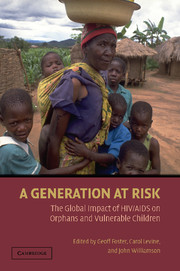Book contents
- Frontmatter
- Contents
- Foreword
- Preface
- Contributors
- Introduction: HIV/AIDS and Its Long-Term Impact on Children
- 1 Family and Community-Based Care for Children Affected by HIV/AIDS: Strengthening the Front Line Response
- 2 Strengthening Households and Communities: The Key to Reducing the Economic Impacts of HIV/AIDS on Children and Families
- 3 The Response of the Educational System to the Needs of Orphans and Children Affected by HIV/AIDS
- 4 Psychosocial Impact of the HIV/AIDS Epidemic on Children and Youth
- 5 Human Rights and Children Affected by HIV/AIDS
- 6 Religion and Responses to Orphans in Africa
- 7 Making the Right Choices in the Asia-Pacific Region: Protecting Children and Young People from HIV and Its Impacts
- 8 Troubled Tapestries: Children, Families, and the HIV/AIDS Epidemic in the United States
- 9 Interventions to Support Children Affected by HIV/AIDS: Priority Areas for Future Research
- 10 Finding a Way Forward: Reducing the Impacts of HIV/AIDS on Vulnerable Children and Families
- Chronology of Important Events
- Resource Guide
- Index
Preface
Published online by Cambridge University Press: 05 June 2012
- Frontmatter
- Contents
- Foreword
- Preface
- Contributors
- Introduction: HIV/AIDS and Its Long-Term Impact on Children
- 1 Family and Community-Based Care for Children Affected by HIV/AIDS: Strengthening the Front Line Response
- 2 Strengthening Households and Communities: The Key to Reducing the Economic Impacts of HIV/AIDS on Children and Families
- 3 The Response of the Educational System to the Needs of Orphans and Children Affected by HIV/AIDS
- 4 Psychosocial Impact of the HIV/AIDS Epidemic on Children and Youth
- 5 Human Rights and Children Affected by HIV/AIDS
- 6 Religion and Responses to Orphans in Africa
- 7 Making the Right Choices in the Asia-Pacific Region: Protecting Children and Young People from HIV and Its Impacts
- 8 Troubled Tapestries: Children, Families, and the HIV/AIDS Epidemic in the United States
- 9 Interventions to Support Children Affected by HIV/AIDS: Priority Areas for Future Research
- 10 Finding a Way Forward: Reducing the Impacts of HIV/AIDS on Vulnerable Children and Families
- Chronology of Important Events
- Resource Guide
- Index
Summary
In July 1992 at the VIII International Conference on AIDS in Amsterdam, two of this book's editors, Geoff Foster and Carol Levine, were among the few participants with poster presentations devoted to children, either HIV-infected or orphaned. The ways that children were being affected by the emerging pandemic were neither widely recognized nor understood. Geoff, a pediatrician from Zimbabwe, had a presentation on the Family and AIDS Caring Trust (FACT), an organization he founded, and Carol, a health policy and medical ethics specialist from New York City, was presenting the Orphan Project's efforts to respond to the needs of children and families affected by the epidemic. There were no child-related plenary sessions at the conference, no workshops, no oral presentations. The sparse number of poster presentations was equaled by the meager number of people who stopped by to read them and talk to us and other presenters. Since the posters were placed at the outer edge of the vast conference hall (“on the Belgian border,” we joked), some of those few visitors were people who were lost. This paucity of interest gave us time to share information about Africa and the United States.
We met again in 1996 at the Ⅺ International Conference in Vancouver, and this time we were somewhat closer to the center of the action, although there were still few opportunities at the conference for discussion of children affected by HIV/AIDS.
- Type
- Chapter
- Information
- A Generation at RiskThe Global Impact of HIV/AIDS on Orphans and Vulnerable Children, pp. ix - xiiPublisher: Cambridge University PressPrint publication year: 2005

